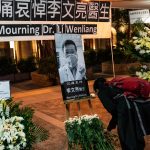Originally published in Asia Times
The Chinese government saw to it that Dr Li Wenliang suffered before he died. Li, a physician at Wuhan Central Hospital in Wuhan, Hubei province – the epicenter of the now global infectious coronavirus – succumbed to the illness on Thursday. We know of Li because he incurred the wrath of Chinese authorities by challenging Beijing’s initial upbeat narrative in December of a limited outbreak that was well under the control of Chinese authorities.
Li, on the frontlines of the epidemic, watched as people mobbed Wuhan hospitals with symptoms of an obviously much more serious contagion than what the Chinese government was publicly disclosing.
On December 30, Li aired his concerns on social media, warning the public of a possible “SARS-like” virus spreading in Wuhan, a reference to the 2002-2003 outbreak of severe acute respiratory syndrome that authorities covered up for months. That cover-up allowed SARS to spill over China’s borders and eventually kill more than 700 people across 26 countries.
Within days of airing his concerns, Li learned the price that whistleblowers in China routinely pay: Wuhan police briefly detained him and made clear that the cost of his freedom was to sign a statement that posting an online warning about the coronavirus constituted “illegal behavior.” The authorities’ underlying threat to Li was as clear as it was brutal: Stay silent or face the wrath of the Chinese state.
Weeks later, the coronavirus that Li sought a more truthful and robust government response to ended up killing him. Li’s name has now been added to the list of the hundreds of confirmed coronavirus fatalities in China, a list that will only grow, given the more than 31,000 known cases of the illness in the country. Li’s courageous act of defiance and its tragic consequence are stark reminders of how China’s authoritarian system is resolutely antithetical to ensuring the basic health rights of its citizens and the ability of doctors to address public health crises effectively.
I documented the official cover-up of the 2002-2003 SARS outbreak as a Beijing-based foreign correspondent, and the tragedy of Li’s death and the unfolding global menace of the 2019-nCoV coronavirus leaves me with a grim sense of déjà vu. In those pre-social-media days, my colleagues and I heard for weeks vague stories of a mysterious contagious illness, of emergency wards filled with SARS cases, of a government that was lying through its teeth about the severity of the problem.
We chased rumors of “midnight runs” by hospital ambulances and buses loaded with SARS cases put on the road to hoodwink World Health Organizations investigators who were desperate to get a fix on the spread of illness. Those rumors were decisively confirmed only when another brave Chinese whistleblower, Dr Jiang Yanyong, exposed the extent of the government’s whitewash and forced it to cooperate with international authorities in addressing the outbreak.
In its aftermath, there was widespread hope that the Chinese government would learn “the lessons of SARS” and that it would never again sacrifice public health for reasons of perceived political expedience. If only. As the coronavirus spreads across the world, anyone who still maintains that China learned the lessons of SARS is either not paying attention or is parroting a Chinese government narrative long proved false. Instead, since SARS, the Chinese government has repeatedly demonstrated its willingness to deny, censor, and suppress any issues it deems politically “sensitive,” regardless of the public health implications.
Two years after SARS, the government blocked all domestic media reports of the massive spill of the toxic chemical benzene in the Songhua River in Heilongjiang province until wild rumors about the disaster prompted disclosure of what had actually happened.
Later, an official ban on reporting of “all food-safety issues” in the lead-up to and during the 2008 Beijing Olympic Games stifled domestic media coverage of revelations that at least 20 dairy firms were spiking milk products with the chemical melamine. That cover-up contributed to the deaths of six children and illness among 300,000 others. Adding insult to already grievous injury, Chinese authorities handed down a two-and-a-half-year prison term to the father of one of those child victims, on charges of “provoking disorder” for drawing attention to the government’s failure to assist the thousands who became ill.
In 2011, Chinese authorities literally buried the evidence of a horrific high-speed-rail crash that killed 38 people and injured dozens more by dispatching earth-moving equipment to entomb the wrecked train at the crash scene.
A vaccine scandal in July 2018 linked to substandard vaccines distributed to thousands of infants was one of the most heavily censored issues in China that year.
Perhaps the most telling indicator of the Chinese government’s hard-wired hostility to transparency is its official reaction to Dr Li Wenliang’s demise. Hours after state media reported his death, official censors scrubbed the Chinese Internet of any mention of his passing without explanation. Until the international community imposes a substantive cost on China’s pathological antipathy to reasoned responses to public health crises – particularly those, like the Wuhan coronavirus, with international dimensions – courageous whistleblowers like Li Wenliang will continue to be unfairly silenced and punished, rather than celebrated and praised.

